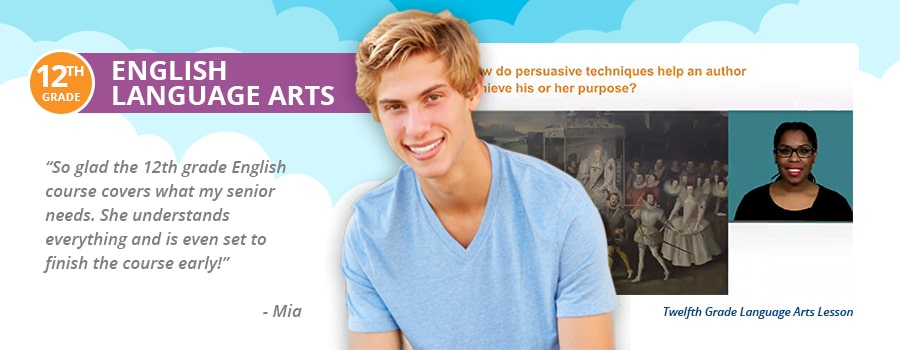12th Grade English Language Arts Curriculum
A proficiency in 12th grade language arts (reading, writing, and communication) is essential to success in college or career. In fact, English language arts skills are arguably the most important that students obtain because they are essential to the study of all other subjects.
On this page you will discover the key English language arts (ELA) concepts your 12th grader will need to know, learn more about the objectives for each of the areas of 12th grade ELA curriculum, and find out how Time4Learning’s 12th grade English curriculum helps homeschool families achieve their goals for this important year of education.
What Do You Learn in 12th Grade English Language Arts?
A typical course of study for 12th grade English Literature would include literature, composition, grammar, and vocabulary. Using Time4Learning’s 12th grade English IV curriculum, students will focus in on the study of British Literature, and cover topics such as:
- Identifying the ideas, values, and themes of a historical period from the poetry of Shakespeare, Donne, Marvell, and others.
- Exploring the societal issues of the period through reading The Canterbury Tales and Paston Letters.
- Looking closely at symbolism in the works of William Blake.
- Analyzing the mystery genre by reading Sir Arthur Conan Doyle.
- Building vocabulary through Greek and Latin root study.
- Writing analytical essays to demonstrate their understanding of a text.
Learn more about Time4Learning’s twelfth grade English language arts lesson plans below.
Reading Goals/Objectives for 12th grade
At the high school level, reading instruction moves past decoding and fluency and focuses more on vocabulary and comprehension. Individual remediation may be needed in specific areas, particularly if standardized tests have consistently shown weakness in one or more skills. Some of the goals of reading curriculum for senior year may include:
- Using the analysis of root words, affixes, synonyms, and antonyms to understand unfamiliar words in text.
- Identify the meanings of common idioms and literary allusions.
- Comparing and contrasting how British literature has developed in a historical context.
- Recognizing the elements of various genres of literature.
- Comparing and contrasting conventional and contemporary poetry.
- Draw conclusions and make inferences on information presented in non-fiction texts.
Writing Goals/Objectives for 12th grade
12th graders practice all forms of writing, with an emphasis on writing coherent and focused persuasive essays that convey a well-defined perspective and tightly reasoned argument. By their senior year, students should be able to think critically about ideas and then present their conclusions in a clear and well-organized composition.
Twelfth grade writing objectives will include:
- Using the writing process (prewriting, drafting, revising, editing, and publishing) when writing an essay.
- Writing in a variety of forms, according to the purpose or audience of the text.
- Being able to critically analyze their own writing as well as the writing of others.
- Using the rules and conventions of grammar to write clearly and effectively.
Grammar Goals/Objectives for 12th Grade
Because the rules of grammar are tested on college entrance exams, it is important that 12th graders review the core conventions. Grammatical concepts that often trip up even high school students include:
- Subject-pronoun agreement
- Parallel sentence structure
- Verb tense
- Comparatives and superlatives
- Noun agreement
- Commas and conjunctions
Time4Learning’s 12th Grade Language Arts Scope & Sequence
- Part 1: Epic Poetry: Gilgamesh
- Part 2: Epic Hero: Gilgamesh
- Part 3: Writing to Analyze the Epic Hero in Gilgamesh
- Introduction to Anglo-Saxon Literature: Beowulf
- Characterization in Grendel
- Building Vocabulary: Word Roots, Affixes, and Reference Materials
- Writing a Narrative Application Essay
- Satire in The Pardoner’s Tale
- Chivalry in the Middle Ages: Sir Gawain and the Green Knight
- Central Ideas and Context: Utopia
- Parts of Speech: Gerunds, Participles, and Infinitives
- Writing an Informative Essay about a Utopia
- Speeches of Queen Elizabeth I
- Part 1: An Introduction to Elizabethan England
- Part 2: Summarizing Central Ideas about Elizabethan England
- Part 3: Text Structure in an Informational Text
- Part 4: Writing to Evaluate Mortimer’s Style
- Connecting Sentences and Clauses
- Creating a Time Travel Brochure
- Hamlet, Part 1: An Introduction to Elizabethan Theater
- Hamlet, Part 2: Word Choice and Tone
- Hamlet, Part 3: Figurative Language and Allusions
- Hamlet, Part 4: Comparing and Contrasting Interpretations
- Hamlet, Part 5: Characteristics of Elizabethan Drama
- Hamlet, Part 6: Applying Literary Criticism
- Hamlet, Part 7: Plot and Character
- Hamlet, Part 8: Themes
- Creating a Storyboard
- Central Ideas in A Vindication of the Rights of Woman
- Satire in Swift’s “A Modest Proposal”
- Satire in Swift’s “A Modest Proposal” (Continued)
- Comparing Eighteenth-Century Texts on Slavery
- Word Meaning in the Preface to A Dictionary of the English Language
- Writing a Research-Based Informative Essay about Language
- Enlightenment Ideas in America
- Introduction to Romanticism
- Themes in the Poetry of Keats
- Haiku and Romantic Poetry
- Speaking and Listening: Planning a Multimedia Presentation
- Writing a Literary Analysis Essay about Poetry
- Cumulative Exam
- Part 1: Gothic Fiction: The Strange Case of Dr. Jekyll and Mr. Hyde
- Part 2: The Strange Case of Dr. Jekyll and Mr. Hyde: Plot Development and Conflict
- Part 3: The Strange Case of Dr. Jekyll and Mr. Hyde: Making Inferences and Predictions
- Part 4: The Strange Case of Dr. Jekyll and Mr. Hyde: Theme
- Part 5: The Strange Case of Dr. Jekyll and Mr. Hyde: Summary and Plot Development
- Part 6: The Strange Case of Dr. Jekyll and Mr. Hyde: Character
- Part 7: The Strange Case of Dr. Jekyll and Mr. Hyde: Conflict and Resolution
- Edgar Allan Poe’s “The Tell-Tale Heart”
- Creating a Movie Poster
- Part 1: A Comedy of Manners: The Importance of Being Earnest
- Part 2: Literary Devices in The Importance of Being Earnest
- Part 3: Characterization in The Importance of Being Earnest
- Comparing and Contrasting Two Versions of The War of the Worlds
- Using Pronouns Correctly
- Writing an Argumentative Essay about an Ethical Issue
- Style in Poems by Rabindranath Tagore
- Sound and Structure in Poems by Dylan Thomas and W. B. Yeats
- Analyzing US World War II Political Messages
- Using Punctuation
- Writing an Analysis of Media Messages
- Part 1: Text Details and Context Clues in an Informational Text
- Part 2: Summarizing an Author’s Viewpoint in an Informational Text
- Part 3: Using Media to Extend Understanding of an Informational Text
- Analyzing Ekphrastic Poetry
- Contested Usage
- Creating a Museum Exhibit
- Fantasy Literature: J. R. R. Tolkien’s The Fellowship of the Ring
- Contemporary Poetry: Seamus Heaney’s “Digging”
- Writing a Persuasive E-mail
- Allusions and Perspective in Derek Walcott’s Midsummer
- Historical and Cultural Context in “Civil Peace”
- Analyzing a Procedural Text: How to Find Out Anything
- Analyzing Career Information from the Bureau of Labor Statistics Website
- Writing a Personal Statement
- Purpose and Format in “The Leader in the Mirror”
- Speaking and Listening: Formal Debate
- Writing an Argument about How to Define Success
- Cumulative Exam
Why Choose Time4Learning 12th Grade English Language Arts Homeschool Curriculum?
Time4Learning’s senior-year English Language Arts course invites homeschoolers to explore a diverse collection of texts organized into thematic units. Students will engage in literary analysis and inferential evaluation of both classic and contemporary literature. While critically reading fiction, poetry, drama, and expository nonfiction, 12th graders will learn comprehension and literary-analysis strategies. Tasks will build oral language skills and produce creative, coherent writing.
Learn more about our online 12th grade curriculum, designed to help your child learn and master their fundamental concepts.







